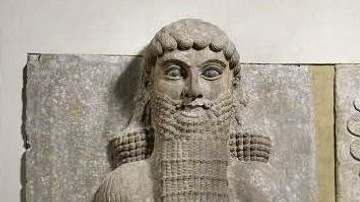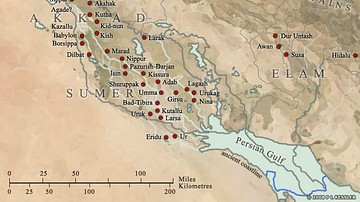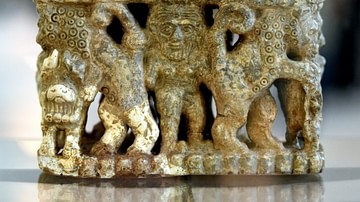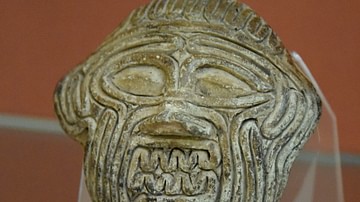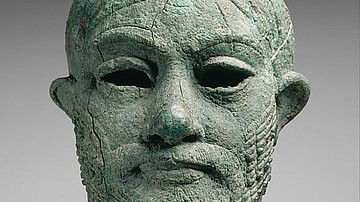The Death of Gilgamesh is a Sumerian poem relating the death and afterlife of the famous hero-king of Uruk, who had become a legendary figure. The piece is dated to before the Ur III Period (2047-1750 BCE), and although its theme informs The Epic of Gilgamesh, it is not always included in modern-day translations.

The standard version of The Epic of Gilgamesh was discovered in 1849 by the British archaeologist Austen Henry Layard at the same time that many expeditions were launched to the Near East to find physical evidence to corroborate biblical narratives. Ironically, these efforts would result in the discovery of cuneiform tablets which, once translated, challenged the accepted belief in the Bible as a wholly original work and the oldest in the world.
When The Epic of Gilgamesh was first translated in 1876, including the story of the Great Flood, and predating the biblical tale of Noah and his ark, the understanding of world history was forever changed as the culture of ancient Mesopotamia came to light. Further expeditions unearthed more cuneiform tablets and, among them, The Death of Gilgamesh, discovered in the ruins of the ancient cities of Nippur and Me-Turan (modern-day Tell-Haddad), Iraq, between 1899-1900. The precise date of composition is unknown, but the poem is understood to have informed later works and, famously, The Epic of Gilgamesh in its focus on the brevity of life and certainty of death.
Summary & Commentary
The poem is sometimes associated with The Death of Ur-Nammu, dated from the reign of Shulgi of Ur (2029-1982 BCE) of the Ur III Period in that it deals with a great hero's death and his arrival in the afterlife. It is sometimes suggested that The Death of Ur-Nammu influenced The Death of Gilgamesh, but the extant copies of the latter suggest The Death of Gilgamesh was recited as part of an oral tradition before the Ur III Period and may have influenced the author of The Death of Ur-Nammu, though this claim is challenged.
There are a number of fragmentary versions of the text, but the most cohesive seems to be from Me-Turan. The work begins with the failing health of King Gilgamesh, though no cause is given, only that he can no longer eat or drink, stand up or sit down (Segments A-E), suggesting illness or advanced age (according to legend, he reigned for 126 years). Lines 13-19 of Segment A reference the underworld deity Namtar, son of Ereshkigal, Queen of the Underworld, who was known as the herald of death.
In Segment F, Gilgamesh dies and arrives in the underworld where he is honored for his many achievements in life. There seems to have been some discussion among the gods concerning his fate (the lines are missing) as Enki, the god of wisdom, asks whether Gilgamesh could not be spared owing to his mother, the goddess Ninsun (also known as Ninsumun), but this cannot be as Gilgamesh, though a demigod, was still mortal and so must share all mortals' fate.
Owing to his semi-divine status and heroic life, he is made a judge of the dead, on equal standing with the underworld deities Ninjiczida and Dumuzid (lines 38-41), but this seems small consolation to Gilgamesh who mourns not only his own passing but that of everyone on earth who is born only to die. The gods offer comfort by telling him he will now join the Anuna gods, the ancient deities, and meet those he had lost in life including his dear friend Enkidu (lines 63-81).
Gilgamesh then wakes from a dream in which he is alive again, sent to him by Nudimmud (another name for Enki), and the scene replays his arrival in the underworld and the decision of the gods to honor him as judge. This repetition of lines, ending with a different conclusion, is common in Mesopotamian poetry and the aspect suggesting an oral tradition. Here, after the earlier lines repeat, the scene ends with the gods telling him how there is no reason to be depressed over his fate as he had to have always known death was inevitable (lines 143-153).
Segment H gives the famous scene in which the Euphrates River parts after his death and his tomb is built in the riverbed, and in 2003, a German expedition claimed to have found this tomb in the location given in the poem. Segment K ends the work with Gilgamesh again depressed with the knowledge that all living things must die, and his individual grief is addressed as universal by the narrator who then speaks to "all the people" and reminds them that no one truly dies as long as they are remembered by the living.
The work ends with praise for Ereshkigal – given here as the mother of Ninazu (who is usually the son of Gula, goddess of health and healing). As Ninazu was the god of transition and transformation, who helped the souls of the dead move on in the afterlife, it is suggested he is at the side of Gilgamesh to do the same for him.
The Text
The following excerpt is taken from The Electronic Text Corpus of Sumerian Literature translated by scholar Jeremy Black et al. Ellipses indicate missing words or lines, while question marks suggest alternate translations for words. The version given is from the Me-Turan manuscript.
SEGMENT A
1-12: The great wild bull has lain down and is never to rise again. Lord Gilgamesh has lain down and is never to rise again. He who was unique in ... has lain down and is never to rise again. The hero fitted out with a shoulder-belt has lain down and is never to rise again. He who was unique in strength has lain down and is never to rise again. He who diminished wickedness has lain down and is never to rise again. He who spoke most wisely has lain down and is never to rise again. The plunderer (?) of many countries has lain down and is never to rise again. He who knew how to climb the mountains has lain down and is never to rise again. The lord of Kulaba has lain down and is never to rise again. He has lain down on his deathbed and is never to rise again. He has lain down on a couch of sighs and is never to rise again.
13-19: Unable to stand up, unable to sit down, he laments. Unable to eat, unable to drink, he laments. Held fast by the door-bolt of Namtar, he is unable to rise. Like a ... fish ... in a cistern, he ... ill. Like a captured gazelle buck, he ... couch. Namtar with no hands or feet, who ... one by night,
1 line fragmentary
unknown no. of lines missingSEGMENT B
(The sequence of Segments B, C, D, and E is uncertain)
1-5: Then the young lord, lord Gilgamesh,
4 lines fragmentary
unknown no. of lines missingSEGMENT C
(The sequence of Segments B, C, D, and E is uncertain)
1-9: 4 lines fragmentary
Then the young lord, lord Gilgamesh,
4 lines fragmentary
unknown no. of lines missingSEGMENT D
(The sequence of Segments B, C, D, and E is uncertain)
1-11: 11 lines fragmentary
unknown no. of lines missingSEGMENT E
(The sequence of Segments B, C, D, and E is uncertain)
1-7: 5 lines fragmentary
Gilgamesh ...
1 line fragmentary
unknown no. of lines missingSEGMENT F
1-22: 2 lines fragmentary
Then the young lord, lord Gilgamesh, lay down on his death-bed.
2 lines fragmentary
After lord Gilgamesh had arrived at the assembly, the pre-eminent place of the gods, they said to lord Gilgamesh concerning him: "As regards your case: after having travelled all the roads that there are, having fetched cedar, the unique tree, from its mountains, having killed Huwawa in his forest, you set up many stelae for future days, for days to come. Having founded many temples of the gods, you reached Zi-ud-sura in his dwelling place (1 ms. has instead: place). Having brought down to the Land the divine powers of Sumer, which at that time were forgotten forever, the orders, and the rituals, he (?) carried out correctly the rites of hand washing and mouth washing ..."
1 line fragmentary
3 lines missing23-37: 2 lines fragmentary
Enlil's advice was given to Enki. Enki answered An and Enlil: "In those days, in those distant days, in those nights, in those distant nights, in those years, in those distant years, after the assembly had made the Flood sweep over to destroy the seed of mankind, among us I was the only one who was for life (?), and so he remained alive (?) – Zi-ud-sura, although (?) a human being, remained alive (?). Then you made me swear by heaven and by earth, and ... that no human will be allowed to live forever (?) any more. Now, as we look at Gilgamesh, could not he escape because of his mother?"38-41: (Another god speaks:) "Let Gilgamesh as a ghost, below among the dead, be the governor of the nether world. Let him be pre-eminent among the ghosts, so that he will pass judgments and render verdicts, and what he says will be as weighty as the words of Ninjiczida and Dumuzid."
42-62: Then the young lord Gilgamesh became depressed because of (?) all mankind. "You should not despair, you should not feel depressed.
1 line fragmentary
Mighty youths and ... a semicircle ...
14 lines missing63-81: "Go ahead to the place where the Anuna gods, the great gods, sit at the funerary offerings, to the place where the en priests lie, to where the lagar priests lie, to where the lumah priests and the nindijir priestesses lie, to where the gudu priests lie, to where the linen-clad priests lie, to where the nindijir priestesses lie, to where the ... lie, to the place where your father, your grandfather, your mother, your sisters, your ..., to where your precious friend, your companion, your friend Enkidu, your young comrade, and the governors appointed by the king to the Great City are, to the place where the sergeants of the army lie, to where the captains of the troops lie,
3 lines missing
From the house of ..., the ... will come to meet you. Your jewel will come to meet you, your precious one will come to meet you. The elders of your city will come to meet you. You should not despair, you should not feel depressed."82-86: "He will now be counted among the Anuna gods. He will be counted a companion of the (1 ms. adds: great) gods. ... the governor of the nether world. He will pass judgments and render verdicts, and what he says will be as weighty as the words of Ninjiczida and Dumuzid."
87-99: And then the young lord, lord Gilgamesh, woke up ... ... his eyes, ... ... a dream ...! ... a dream ...!
3 lines fragmentary
"Am I to become again as I were ... on the lap of my own mother Ninsumun? ... who makes the great mountains tremble (?). Namtar with no hands or feet takes away ..."
1 line fragmentary100-115: Lord Nudimmud made (?) him see a dream: After lord Gilgamesh had arrived at the assembly, the pre-eminent place of the gods, they said to lord Gilgamesh concerning him: "As regards your case: after having travelled all the roads that there are, having fetched cedar, the unique tree, from its mountains, having killed Huwawa in his forest, you set up many stelae for future days ... Having founded many temples of the gods,
1 line fragmentary
Having brought down to the Land the divine powers of Sumer, which at that time were forgotten forever, the orders, and the rituals, he (?) carried out correctly the rites of hand washing and mouth washing. ... the settlements of the countries."
2 lines fragmentary116-130: 1 line fragmentary
... Gilgamesh ... Enlil's advice was given to Enki. Enki answered An and Enlil: "In those days, in those distant days, in those nights, in those distant nights, in those years, in those distant years, after the assembly had made the Flood sweep over to destroy the seed of mankind ..., among us I was the only one who was for life (?). He remained alive (?); Zi-ud-sura alone, although (?) a human being, remained alive (?). Then you made me swear by heaven and by earth, and I swore that no human will be allowed to live forever (?) any more. Now, as we look at Gilgamesh, could not he escape because of his mother?"131-134: (Another god speaks:) "Let Gilgamesh as a ghost, below among the dead, be the governor of the nether world. Let him be pre-eminent among the ghosts, so that he will pass judgments and render verdicts, and what he says will be as weighty as the words of Ninjiczida and Dumuzid."
135-142: Then the young lord, lord Gilgamesh, became depressed because of (?) all mankind. "You should not despair, you should not feel depressed.
1 line fragmentary
Mighty youths and ... a semicircle ... Without him (i.e. Gilgamesh) ... Sisig (a god of dreams), the son of Utu (the sun god), will provide light for him in the place of darkness."143-153: "You must have been told (?) that this is what your being (?) a human involves. You must have been told (?) that this is what the cutting of your umbilical cord involved. The darkest day of humans awaits you now. The solitary place of humans awaits you now. The unstoppable flood-wave awaits you now. The unequal struggle awaits you now. The unavoidable battle awaits you now. The evil (?) from which there is no escape awaits you now. But you should not go to the underworld with heart knotted in anger. May it be ... before Utu. Let it be unravelled like palm-fibre and peeled (?) like garlic.
154-167: "Go ahead to the place where the Anuna gods, the great gods, sit at the funerary offerings, to the place where the en priests lie, to where the lagar priests lie, to where the lumah priests and the nindijir priestesses lie, to where the gudu priests lie, to where the linen-clad priests lie, to where the nindijir priestesses lie, to where the ...... lie, to the place where your father, your grandfather, your mother, your sisters, your ......, to where your precious friend, your companion, your friend Enkidu, your young comrade, and the governors appointed by the king to the Great City are, to the place where the sergeants of the army lie, to where the captains of the troops lie. ... the Great City Arali ...
1 line fragmentary168-172: "From the house of the sisters, the sisters will come to meet you. From the house of ..., ... will come to meet you. Your jewel will come to meet you, your precious one will come to met you. The elders of your city will come to meet you. You should not despair, you should not feel depressed."
173-174: "He ... the Anuna gods. He will be counted a companion of the great gods.
unknown no. of lines missingSEGMENT G
1-5: 5 lines fragmentary
SEGMENT H
1-9: 5 lines fragmentary
His architect (?) designed his tomb like ... His god Enki showed him where the solution of the dream lies by ... No one but the ... of the king could solve the vision.10-32: The lord imposed a levy on his city. The herald made the horn signal sound in all the lands: "Uruk, arise! Open up the Euphrates! Kulaba, arise! Divert the waters of the Euphrates!" Uruk's levy was a flood, Kulaba's levy was a clouded sky. Meanwhile not even the first month had passed (1 ms. has instead: ...), it was not five or ten days before they had opened up the Euphrates and diverted its high water. Utu looked at its shells with admiration. Then as soon as the water in the bed of the Euphrates had receded, his tomb was built there from stone. Its walls were built from stone. Its door leaves were installed in the sockets (?) of the entrance. Its bolt and thresholds were hard stone. Its door-pivots were hard stone. They installed its gold beams. Heavy block of stone were moved to ... ... was covered with a thick layer of (1 ms. has instead: was covered (?) with) dark soil. ... for future days.
1 line fragmentary
... who are searching for it should not find its precinct (?). He set up a solid house in the middle of Uruk.33-41: His beloved wife, his beloved children, his beloved favourite and junior wife,
7 lines fragmentary
unknown no. of lines missingSEGMENT I
1-7: ... Gilgamesh ...
3 lines fragmentary
... entered, ... its entrance. ... opened up the Euphrates, ... its water.
1 line fragmentary8-10: Then the young lord, lord Gilgamesh,
2 lines fragmentary
unknown no. of lines missingSEGMENT J
1-11: 2 lines fragmentary
... Gilgamesh ...
8 lines fragmentary
unknown no. of lines missingSEGMENT K
1-2: ... to the city ... ... smeared with dust ...
3-12: ... lord Gilgamesh despaired and felt depressed. For all the people, whoever they may be, funerary statues are made for future days, and set aside in the temples of the gods. Their names, once uttered, do not sink into oblivion. Aruru, the older sister of Enlil, provides them with offspring for that purpose (?). Their statues are made for future days and they are mentioned in the Land. Ereshkigal, mother of Ninazu, it is sweet to praise you!
